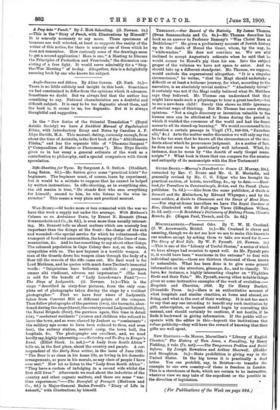THEOLOGY.—Our Record of the Nativity. By James Thomas. (Swan Sonnenschein
and Co. 6s.)—Mr. Thomas describes hie book as an answer to Professor Ramsay's " Was Christ Born at Bethlehem?" He gives a preliminary account of Jewish history up to the death of Herod the Great, whom, by the way, he " whitewashes." He does not convince us. We are still inclined to accept Augustus's estimate when he said that he would sooner be Herod's pig than his son. Into the subject proper of the volumes we have not space to enter. And we should take up a different standpoint. Mr. Thomas, we suppose, would exclude the supernatural altogether. " It is a singular circumstance," he writes, "that the Magi should undertake a difficult or at least a toilsome journey, for what, according to the narrative, is an absolutely trivial motive." "Absolutely trivial" it certainly was not if the Magi really believed what St. Matthew says they believed. Mr. Thomas can understand that they might have made such a pilgrimage to hear a great teacher,—but to see a new-born child ! Surely this shows no little ignorance of ancient ways of thinking. But Mr. Thomas has some strange opinions. " Not a single discovery or invention valuable to the human race can be attributed to Rome during the period in which it wielded the resources of the world and had the freest access to all its stored-up learning." We would recommend to his attention a certain passage in Virgil (VI., 848-854, "Excudent alii," &c.) As to the matter under discussion we will only say that he is far too sure that he knows all the circumstances of the inci- dents about which he pronounces judgment. As a matter of fact, he does not seem to be particularly well informed. What, for instance, does he mean by "the dearth of early Gospel manu- scripts" ? What book is there that can compare for the number and antiquity of its manuscripts with the New Testament?


































 Previous page
Previous page